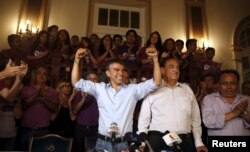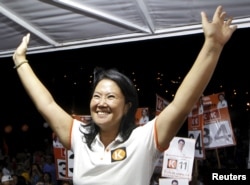Peru barred a presidential hopeful from next month's elections because of vote-buying allegations and also moved toward disqualifying likely runoff contender Julio Guzman in a surprise decision that could turn the race on its head.
Cesar Acuna, a wealthy former governor, and Guzman, a centrist economist, both said they would file appeals by Monday.
The National Jury of Elections can overrule the decisions made Friday by a lower electoral panel.
Guzman, seen by polls as tying front-runner Keiko Fujimori in a likely June runoff, was allowed to stay in the race Feb. 24 after he fulfilled a series of technical requirements related to his party's registration.
But those same technicalities were cited by the Special Jury of Elections, which approves presidential tickets, in accepting a citizen's petition to declare Guzman's candidacy "inadmissible" on Friday, a widely unexpected move that again threatens to upend his bid.
The possibility of throwing out two candidates weeks ahead of April 10 elections has raised questions about how free and fair the vote will be.
Guzman summoned his supporters to a rally in downtown Lima and said he would ask the courts to step in.
"This is a strike against democracy and anticipated fraud," he said on Facebook.
Acuna said he would continue campaigning until his appeal was heard. A local TV channel had broadcast footage of him promising cash to a handicapped man for medical care and to a crowd in a shantytown so they could build a levee.
He repeated that it was merely humanitarian aid. His lawyers have argued that a prohibition on donations by candidates was not in force at the time.
Guzman and Acuna had climbed in polls on the back of voter frustration with the other leading candidates, all well-known politicians who have sought the presidency at least once before, including two ex-presidents and Fujimori, the daughter of jailed ex-president Alberto Fujimori.
Definitively barring either could boost lesser-known candidates who have edged up in recent polls, including leftist lawmaker Veronika Mendoza and left-leaning former Lima mayoral candidate Alfredo Barnechea.
Fujimori could potentially pick up poor and rural votes from Acuna supporters, although probably not enough to give her the 50 percent needed to win outright.
Acuna had 6 percent of voter intent in an Ipsos poll last month, down to fourth place from double-digit figures that had ranked him second before a plagiarism scandal derailed his rise.
Fujimori had 30 percent and Guzman 18 percent, and the two were virtually tied in a run-off scenario.







